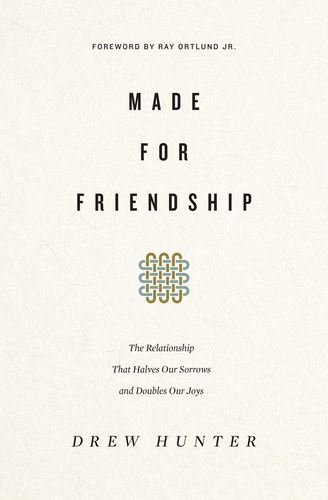10 Biblical Truths about Real Friendship

I’ve never heard anyone say they wish for fewer, less-meaningful relationships. Each one of us longs to be more connected, more deeply, with friends. And this is because God made us for true friendship.
What does the Bible say about friendship? Perhaps more than we may have thought. The theme of friendship weaves through the whole storyline of Scripture, climaxing at the cross of Jesus Christ and stretching out ahead into an eternal future of true friendship. It also gives us the practical wisdom we need to cultivate it well.
Here are ten insights from the Bible to help us recover true friendship:
1. The First Problem in the World Was Not Sin but Solitude
At each step of the way when God created the world, he pronounced that everything was “good.” But then once he created Adam, a statement startles us: something is not good. “It is not good that the man should be alone” (Gen. 2:18). This was before the fall — before sin had entered the world. Adam was not yet complete; he needed community.
What does this show us? Although our deepest problems are sin and idolatry, our first problem was social isolation. Therefore, even today, in a world filled with society, Proverbs warns that the one who “isolates himself. . . breaks out against all sound judgment” (Prov. 18:1).
2. Friendship Is a Whole-Bible Theme
The Bible tells the story of the creation, fracturing, and ultimate restoration of true friendship—friendship with God and also with each other. In the beginning, Adam and Eve enjoyed the fullness of friendship. But their sin led them into hiding (Gen. 3:8), and we’ve been hiding behind our own fig-leaf masks ever since.
Yet God is restoring true friendship. He restores friendship with himself, as he did with Enoch and Noah, who “walked with God”—a Hebrew expression of friendship (Gen. 5:24; Gen. 6:9). Abraham was called “a friend of God” (Isaiah 41:8). Moses spoke with God “face to face, as a man speaks with his friend” (Ex. 33:11). He drew near to all who called upon him with true faith.
And then Jesus came as the great Friend of sinners, befriending all who trust and follow him. He came to lay his life down for his friends (John 15:13-15).
Now all those befriended by God are brought into communities of friendships in the church. We can now befriend others as God in Christ has befriended us.
3. Proverbs Is a Practical Guide to Forging True Friendship
Proverbs gives us wisdom for navigating the complexities of our relationships. And it doesn’t just address relationships in general, but also friendship in particular. For example, it teaches us what to look for in finding true friends (Prov. 13:20; Prov 22:24-25). It shows us why loyalty is so important for cultivating friendship (18:24; 19:6; 27:9–10). It also shows us the one thing that is most damaging to this kind of relationship: spreading secrets (16:28; 17:9).
4. True Friendship Is More Like a Covenant Than a Contract
We often treat relationships as consumers: we befriend for the benefits we receive. But like a contract, when the relationship doesn’t give us the goods we want, we leave.
But the Bible shows us that real friendship is more covenantal than contractual. Proverbs teaches us about “a friend who sticks closer than a brother” (Prov. 18:24). It commands us, “Do not forsake your friend” (27:10). It warns us about the fickleness of fair-weather friends: “Wealth brings many new friends, but a poor man is deserted by his friend” (19:4).
5. Friendship Thickens Church Community
Studies show our culture’s increasing social isolation. We are in the midst of a loneliness epidemic.
But what if local churches felt like countercultural communities of spiritual life and love? Every church is equipped with all the resources needed to be a community of thick relationships. This is our heritage, after all: The book of Acts portrays the church as fulfilling ancient ideals of friendship (Acts 2:42-47;
6. Friendship Is the Goal of the Gospel
Christians rightly think about salvation as forgiveness of sins and eternal life. But it is more than this. Jesus gives all who trust him the privilege of being his friends (John 15:14–15). And what is eternal life, after all? According to Jesus, “this is eternal life, that they know you, the only true God, and Jesus Christ whom you have sent” (John 17:3). He rescued us to forge an intimate relationship with the triune God (14:20–23). God forgives us that we might share in his triune fellowship of love forever.
In the new creation we will enjoy true friendship with all other believers. Our future is a world of friendship.
7. The Cross Is History’s Most Heroic Act of Friendship
Jesus wants us to view the cross in terms of friendship. On the night before he died, as he explained the meaning of the cross to his disciples, Jesus said, “greater love has no one than this, that someone lay down his life for his friends” (John 15:13). The cross is certainly an act of substitutionary atonement, where Jesus bore the wrath of God in our place. But it is also, very personally, a relational act of friendship.
Through his death, Jesus expressed the deepest love for his people. He did not die for an unspecified humanity; he died for specific people. He died for those he considered his dear friends.
8. Jesus Is Our Truest Friend
Many Christians hesitate to call Jesus a friend. But Jesus doesn’t share our hesitations. And it matters to him that we embrace this. He invites us to understand our relationship on terms of friendship (
9. Friendship Shows the World That We Belong to Jesus
When this lonely world of broken relationships sees churches filled with friendships—imperfect friendships, to be sure, but relationships filled with true repentance and forgiveness—then they will know that something has come from above. They will see that our talk of Jesus as the friend of sinners is real.
That’s what Jesus said in John 13:35: “by this all people will know that you are my disciples, if you have love for one another.” And later in this same conversation, Jesus defined this “love for one another” in terms of the mutual love of friends. He said, “This is my commandment, that you love one another as I have loved you” (15:12). And how has he loved us? “Greater love has no one than this, that someone lay down his life for his friends” (15:13). This is how we are to show the world that we are Jesus’ disciples: when we love one another as he loved us, namely, with sacrificial friendship.
10. Friendship––with God and One Another––Is Our Greatest Joy
The apostle John wrote to believers for a purpose: “so that you too may have fellowship with us; and indeed our fellowship is with the Father and with his Son Jesus Christ. And we are writing these things so that our joy may be complete” (
Our greatest joy is found in our fellowship with God and one another. This is why Jonathan Edwards said that friendship is “the highest happiness of moral agents” (Works, 23:350). According to the Bible, our chief happiness is in fellowship with the triune God and all who trust him.
The Bible gives us everything we need to recover a greater vision of true friendship. It shows us even our feeblest of efforts at forging friendships echo a more glorious reality—every friendship is a small and imperfect echo of the triune God, who made us in his image to enjoy friendship forever. Friendship didn’t come from us; it came from God. And he gives us everything we need—through his word and his Spirit—to cultivate it well, for the glory of God.
Photo credit: ©Thinkstock/Fizkes

Originally published October 19, 2018.







